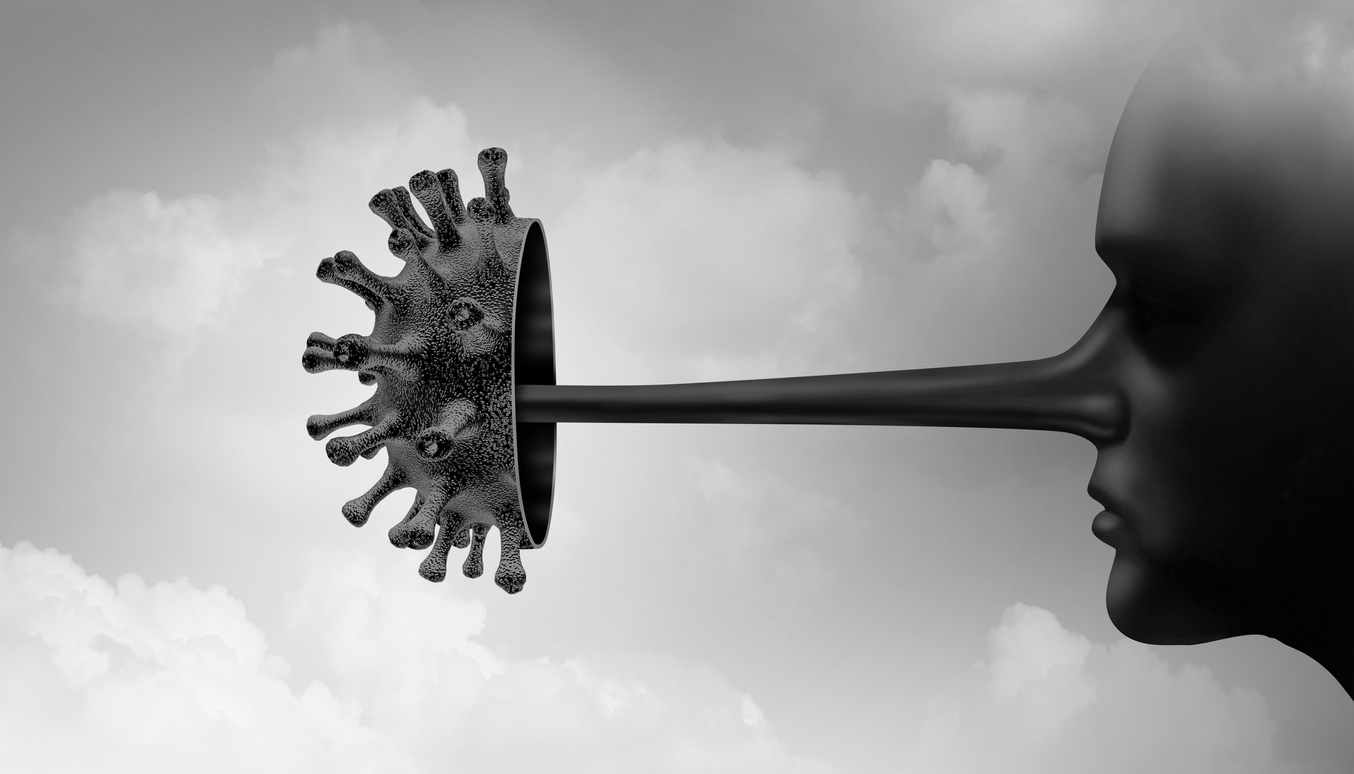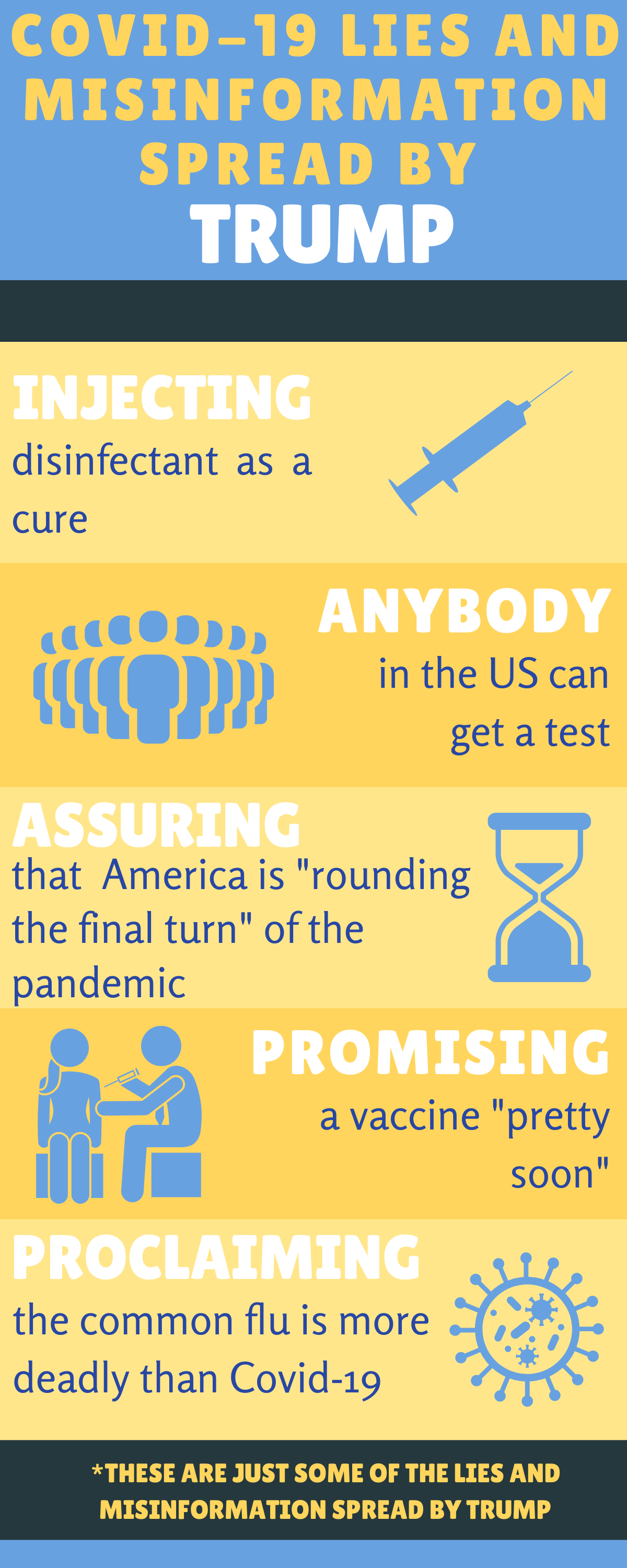We are living a global pandemic of massive proportions that has disrupted our politics, societies and economies, threatening our lives every day and throwing the future of the planet into ever-more-serious doubt. I’m not talking about Covid-19, although that pandemic has been instrumental in highlighting the threat we face from this one: an “infodemic” of covid misinformation.

And, according to a new study, one source has been involved in pushing or spreading an astonishing 38% of the misinformation circulating about the disease.
Have you guessed by now what – or who – that is?
Yes, President Donald J. Trump, the single most powerful voice on the planet, the man whose every word, tweet and appearance has the potential to move markets, break or make careers and most frightening of all, determine public policy.
Cornell University’s study represents the first comprehensive survey of traditional and digital media about the Covid-19 pandemic. The researchers’ results are based on a search and subsequent analysis of 38 million English-language stories published in traditional media around the world from January 1 to May 26, 2020.
No expert would argue with them that “misinformation about COVID-19 is a serious threat to global public health.”
“We conclude that the President of the United States was likely the largest driver of the COVID-19 misinformation ‘infodemic,'” they found in examining the 1,116,952 stories with Covid misinformation.
“Only 16.4% of the misinformation conversation was ‘fact- checking’ in nature, suggesting that the majority of COVID misinformation is conveyed by the media without question or correction.”
(The lapses by mainstream media in fact-checking and correcting that coronavirus misinformation is a subject for another day. That’s just one reason my co-founder, an ex President of Thomson Reuters, and I created VitalBriefing: to ensure that our clients could get reliable and trustworthy information that adhere to longstanding journalistic standards.)
The shape of Covid misinformation

They organized the misinformation into 11 categories in order of frequency:
- Miracle cures
- New World Order/Deep State
- Democratic Party Hoax
- Wuhan Lab/Bioweapen
- Bill Gates
- 5G
- Antisemitic Conspiracies
- Population Control
- Dr. Anthony Fauci
- Plandemic
- Bat Soup
And if any doubt remains about the mortal implications of this problem, consider this: According to the Cornell researchers, in prior pandemics, including HIV/AIDS, the cost of misinformation and its impact on public policy was estimated to be an additional 300,000 deaths in just one country alone — South Africa.
Given that the ultimate cost of pandemic misinformation is death, dwell for a moment on that thought: The single factor most responsible for misinformation in the current pandemic is the president of the United States.
Naïveté is not among my many faults. As a journalist and foreign correspondent, I’ve covered lying politicians and officials at the local, state, national and international levels.
American presidents have lied or misinformed countless times — Lyndon Johnson on Vietnam, Richard Nixon on Watergate, Bill Clinton about Monica Lewinsky, George W. Bush about Iraq, to name a few — but I never would have envisioned the current degree of open and repeated mendacity on the part of the country’s leader.
It is especially notable that while misinformation and conspiracy theories promulgated by ostensibly grassroots sources, such as anti- vaccination groups, 5G opponents, and political extremists, do appear in our analysis in several of the topics, they contributed far less to the overall volume of misinformation than more powerful actors, in particular the US President.
The Cornell Alliance for Science, Department of Global Development, Cornell UniversitY
A lifetime of lying
Trump built his entire career on lies — an aspect of his personality that’s been well documented. His presidency started in character, with his insistence that his inauguration drew record crowds. As of July, according to The Washington Post, the president had made more than 20,000 false or misleading claims — an average of 23 every day — since taking office in January 2017.
And we know there have been many, many more since then.
It’s a short walk from “alternative facts” to outright lying. Clearly, in his flouting of medical advice about mask-wearing and social distancing — despite the efforts of various American doctors to address Covid misinformation, including most notably Dr. Anthony Fauci, director of the National Institute of Allergy and Infectious Diseases — Trump believed the web of falsehoods he has been spinning throughout the pandemic.
It’s all in keeping with “a regime rotten with mendacity,” as New York Times columnist Michelle Goldberg wrote this week, following on the paper’s reporting of how the White House culture as set by the president placed multitudes of staff and visitors at risk — and resulting in the infection of Trump, his wife, and multiple members of the administration.
The Bard Enters 2020
So it’s somehow fitting — Shakespearean, even — that the former reality television star who thought he could define his own reality and bend nature to it found himself in hospital with a life-threatening condition.
The best medical care in the world won’t save him against a virus that doesn’t adhere to “alternate facts.” Playing fast and loose with the truth by purveying pandemic misinformation is lost on nature.
The credibility of this administration and all things Trump is so shredded that there was a dubious reaction globally to the initial news of the Trumps’ infection (Melania Trump also tested positive), and widespread disbelief of official updates on his health.
“What we’re seeing is a very healthy scepticism about anything that comes from the White House,” Kurt Badella, an advisor to the anti-Trump Republican organization The Lincoln Project, tweeted. “These are the same people who have been lying about everybody else’s health in terms of the impact of Covid-19, so why would we expect any differently when they’re talking about themselves?”
“We have an administration that long ago squandered its credibility,” agreed Dan Rather, a senior television journalist covering politics since the early 1960s.
I Don’t Get It
In 2016, as an American expat for most of my adult life, I no longer understood a country that could elect a president whose reliance on lies had been abundantly documented by reputable sources. Now, as a Luxembourg citizen and European, I understand still less a country where, according to polls, some 43% of the electorate still supports him — a man who lies to them as easily as he breathes.
If for no other reason — and there are many — his legitimisation of lying alone disqualifies him for the post of the world’s most powerful figure. Forget “The Art of the Deal,” as his bestselling book was titled. He has made lying an open and acceptable practice, not least for the Republican Party that defends, supports and rallies around him.
His lying gives new cover to autocrats and political elites around the world who routinely mislead their people in an effort to maintain their control, both economically and politically. No longer can America even pretend a veneer of honesty regarding the dissemination of information from its top officials when every day brings fresh examples of their leadership by mendacity, starting with POTUS himself.
“Trump has built what might seem to many people a ridiculous, completely fabricated image on a mountain of lies.”
– Mark Salter, former aide to John McCain
“Trump has built what might seem to many people a ridiculous, completely fabricated image on a mountain of lies,” Mark Salter, a former aide and speechwriter for the late Senator John McCain, told the New York Times. “But that’s his story, and he’s sticking by it.”
Hope for the Future
When the age of Trump is in the rear-view mirror at last, politicians will still lie and officials will still misinform and mislead. My hope, though, is that this bizarre, unreal and surreal epoch, when so many people stopped caring about the difference between the real and the imagined, won’t define the future.
The public’s health — and survival — depend on it.
Again, we founded VitalBriefing to battle misinformation by providing market intelligence that our clients can trust. You can apply the same standards we do in your own consumption of media — especially important regarding Covid-19 and especially when a figure as important as the American president, and his administration, ignores those standards for their political gain.
So, here are six questions to ask when you’re judging the quality of that information and deciding what’s fake news and what’s real:
- Is the publisher credible?
- Is the writer/author/creator credible?
- Is the story itself credible?
- Who is actually in the story?
- Is the story timely?
- How’s the quality of the writing/presentation?
Finally, this video provides a nice textbook example of how not to get fooled. Enjoy:

